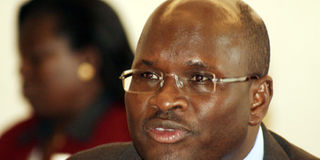New education policy on the way

Education permanent secretary James Ole Kiyiapi has said a new policy on education will be in place before the end of next year April 19, 2011. FILE
A new policy on education will be in place before the end of next year, the Ministry of Education has pledged.
Education PS Prof James Ole Kiyiapi said Tuesday that the new plan will phase out the current policy that was adopted in 2005 as a way of accommodating changes that have occurred since then.
“We expect to have a Sessional Paper on education by next year and a new Act on education to be in line with the new Constitution,” he said during the Joint Review of Education Sector at the Kenya Institute of Education.
According to Prof Kiyiapi, although there have been greater successes under the current programme, the increasing challenges in education demand that a fresh strategy be drawn.
He said much of the policy content will come from the recommendations of the Task Force on Education which is expected to table its report in three months’ time.
The Kenya Education sector support programme was first adopted by the then Ministry of Education, Science and Technology in 2005. It was meant to pursue issues of financing education and the achievement of the millennium development goal of universal basic education for all by looking at the challenges that face education.
The ministry then identified ways of encouraging more school enrollment. In 2008, free secondary education was adopted. According to figures at the Ministry of Education, some of the successes realised include raising the number of those in secondary school from 800,000 to 1.7 million. This is apart from improving the transition from primary school to secondary by 25 percent.
But new challenges have emerged. The number of those in need of basic education, both young and old, has ballooned. The new policy is expected to tackle ways of improving access of education to this number (about 10 million children), fight cultural barriers to education such as female genital mutilation and how to keep children in school even in worst climatic conditions like drought.
Prof Kiyiapi acknowledged that there was need to separate adults going to school from young children to avoid children learning under pressure.
“We have heard adults wanting to go back to school owing to free education; we have come up with a policy for adult centres equipped with facilities for primary and secondary education to avoid destructive learning to our children,” he said.




